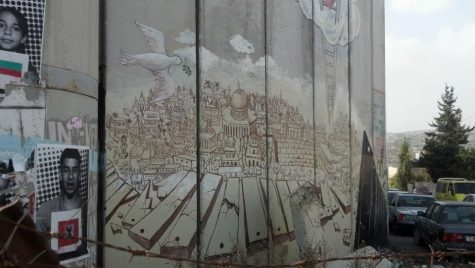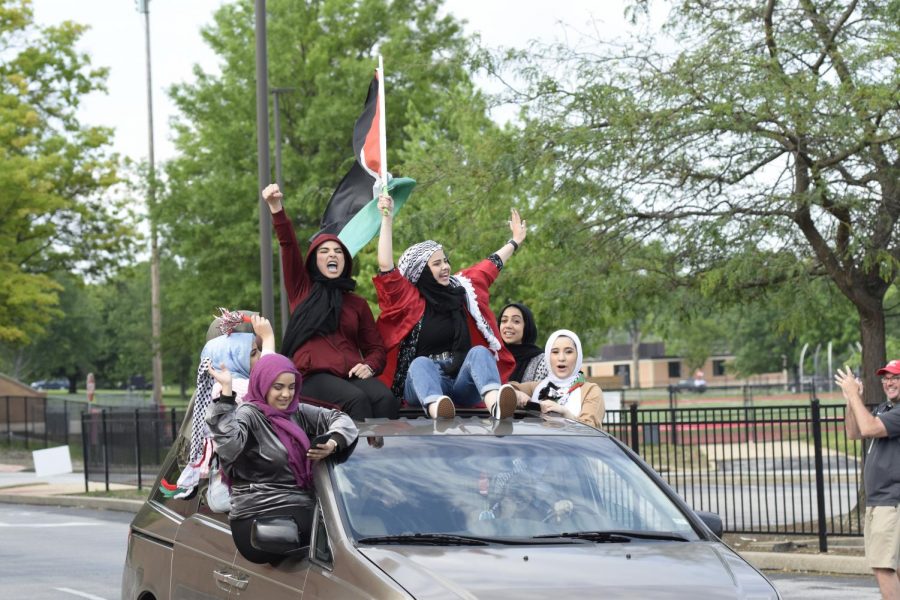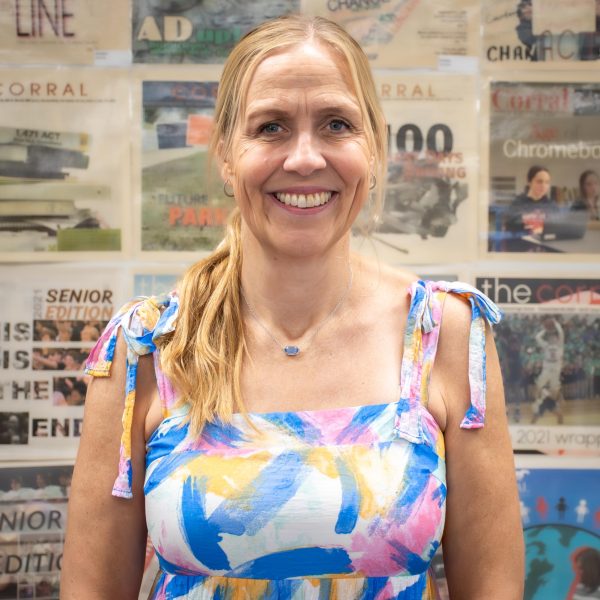Old Conflicts Flare Up
Animosity between Israel and Palestine hits home for some
Shahd Abdelbaset celebrates with the class of 2021. She brought a Palestinian flag to her graduation parade on May 23.
October 6, 2021

From May 10- 21, 2021, the ongoing Israeli-Palestinian conflicts flared up once more. Centuries long conflicts over land settlements have restarted with the firing of rockets from land possessed on both sides.
Palestinian families have continued to face home eviction due to building permit restrictions implemented after WWII, when the United Nations promised Israel its own land. Land settlements have been a source of consternation for many years since, with Palestinians claiming it is wrong to force people out of their homes, while the Israelis have never had land that belonged only to them. On maps in the United States, Israel is a country, but Palestine is not. Legally, there is no Palestinian flag, passport, or other identifier recognized by the law.
At the start of the conflict on May 10, Jerusalem Day, a court hearing was held on the home evictions. For Jews, Jerusalem Day is significant because it commemorates the reunification of Jerusalem in 1967, which other parts of the world may not consider official. The day is marked by a march to the Aqsa Mosque. The Aqsa Mosque is also called the Noble Sanctuary by Muslims, and the Temple Mount by Jews. However, it was raided by Israeli police, and the court hearing was postponed for 30 days. That evening, rockets were fired from the Gaza Strip by Palestines, while the Israeli government began airstrikes. Gaza is controlled by Hamas, which is the major political Palestinian group, which Israel and the U.S. consider a terrorist group.
The attacks caused hundreds of deaths and property damage. 243 Palestinians were killed in Gaza, at least 21 Palestinians were killed in the West Bank, and 12 Israelis were killed. More than 70 of these people were children.
Usually, past conflicts were resolved with a cease fire, either agreed upon by both sides, or internationally. This time, a ceasefire was decided upon. However, major causes such as the home evictions were left unsolved.
Social studies teacher Steven Meizler volunteered at a Palestinian high school while studying religion in the Middle East.
“That experience drove me further into the Palestinian issue and the Israeli issue,” Meizler said. “Especially hearing their stories, what they’ve endured, what they’ve seen, witnessed themselves. It was just eye opening when it comes to learning, because I’ve learned all this stuff, but it’s different when you talk to someone who’s experienced it.”
Junior Aydan Bricker works at her synagogue in the preschool, goes to services on Saturdays, Sunday school, and Jewish summer camp. While she has found ways to see both sides of the Israeli-Palestinian issue, she finds social media a source of hurtful bias.
“What the Israeli government’s doing is wrong, but I think people are blaming Jews altogether and I think there’s sides to both stories,” Bricker said. “The media is often one sided. There’s a lot of pro-Palestine things which is totally fine, however, people have been turning pro-Palestine into anti-Semitism. It’s not a Jewish issue, it’s an Israeli government issue.”
Another common cry on the internet is to have the difficult conversations which most people would rather avoid, and this fear is not without basis in fact. Bricker has tried to respectfully express her opinions, but has been met with hostility.
“When someone got mad at me for saying it was an Israeli government issue and not a Jewish issue, I started crying because I didn’t want to offend anybody,” Bricker said. “I don’t like being confrontational, but the fact that somebody told me that my opinions were wrong and that the information I’m getting is not true, it really hurt my feelings. I know a lot of people in Israel, and they’re saying how nobody agrees with the government there. Most Israelis don’t agree with the government, so saying it’s Jewish people is wrong.”
Central High has a large population of Jewish students, causing the topic to be particularly sensitive. However, it makes for a large gathering of students in the Jewish Student Union (JSU). Rabbi Mike Rovinsky founded JSU in 2003 after observing that teenagers had a lack of interest in incorporating religion in daily life after bar and bat mitzvahs, their coming of age ceremonies. Each year, the JSU provides an opportunity for a gap year in Israel for high school graduates to see their homeland.
“Those who are being killed are my spiritual brothers and sisters,” Rabbi Rovinsky said. “We’ve had alumni there this year. I have a red alert app on my phone that goes off every time a rocket is fired at Israel. Every time it goes off, I stop and try to find a place to hide to feel what it’s like.”
Savanna Abdelghafoor is a district substitute teacher for Parkway. She immigrated to the U.S. at the age of seven from the Gaza Strip in Palestine because of a war between Palestine and Israel, and graduated from North High.
“My country is being stolen,” Abdelghafoor said. “Many innocent lives of Palestinians are being taken. I live here with my parents and siblings, and the rest of my family all live in the Gaza Strip. It breaks my heart hearing my family members talk about how they live in fear. I try as much as I can to spread awareness so people can know the truth.”
The damage done to civilians is not lost on people from all sides.
“It’s complicated. It is so, so complicated,” Meizler said. “Hamas and Gaza do launch rockets into Israel, and Israelis completely demolish whole buildings. The Hamas rockets, they’re completely homemade. It’s not like you’ll necessarily know where it’s going to land. Israelis have pinpoint precision as to where they strike bombs. I don’t necessarily like that power dynamic, because civilians are getting caught up in the crossfire.”
In the end, people are just people.
“It’s important to look at people as people,” Meizler said. “Take the politics out, take the religious elements out. Think about it as though you’re sitting down to dinner with someone, would you be willing to do harm to them or hurt them in any way? You probably wouldn’t. And so, just remember that people are people. Most people just want to be happy. They just want to live their life, and we want to keep that in context when we talk about these big issues. Because that’s really what matters.”


